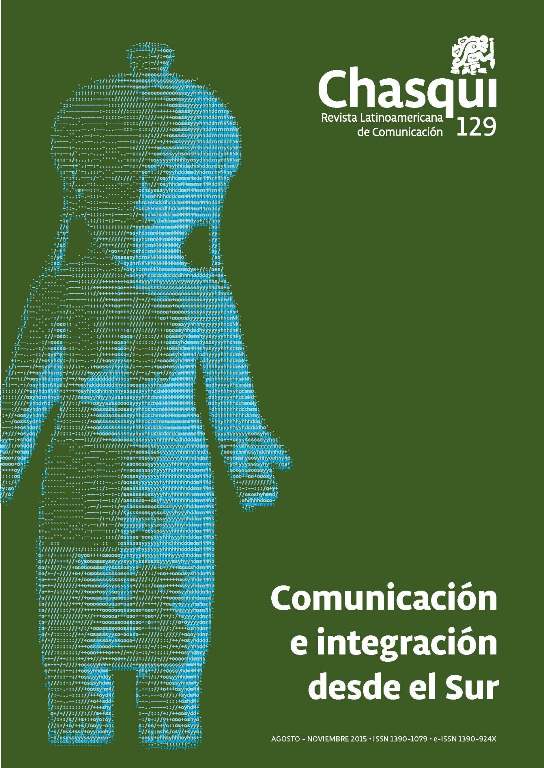The illusion of the fourth estate in Kenya: from conventional media to social networks
DOI:
https://doi.org/10.16921/chasqui.v0i129.2502Keywords:
sub-Saharan Africa, democracy, civil society, structure of information, internet, monopolyAbstract
For a decade, Kenya has established itself as a technological leader in the continent and as a reflection of the proliferation of media, both in East Africa and in sub-Saharan Africa in general. It has also seen a significant growth in mobile phone uptake and the use of the Internet and social networks like Twitter or Facebook so it is having a significant impact for Kenyan economy, political, cultural and social life. However, the monopoly and the control of the sector by a few players blurs the apparent freedom of information that is perceived in the society.References
Bajo, C. (2015, 18 Junio). Ushahidi canaliza la fuerza de la comunidad. El País. Recuperado de http://elpais.com/elpais/2015/06/15/planeta_futuro/1434382839_153766.html
Berman, B. & Lonsdale, J. (1998, enero 1). The labors of ‘Muigwithania’: Jomo Kenyatta as author, 1928-45. Research in African Literatures: Official Journal of the African Literature Committee of the African Studies Association of America and the African Literatures Seminar of the Modern Language Association, 29, 1, 16-42.
Bourgault, L. M. (1995). Mass media in sub-Saharan Africa. Bloomington: Indiana University Press.
Chomsky, N. (2003). Undersatnding power: the indispensable Chomsky. Londres: Vinatge.
Curran, J. (2000). Rethinking media and democracy. En J. Curran & M. Gurevitch (Eds.), Mass media and society (pp. 120-152). Londres: Arnold.
Etling, B.; Faris, R. & Palfrey, J. G. (2010, enero 1). Political Change in the Digital Age: The Fragility and Promise of Online Organizing. Sais Review, 30, 2, 37-49.
Goldstein, J. & Rotich J. (2008). Digitally networked technology in Kenya’s 2007-2008 post-election crisis.
Head, S. W. (1974). Broadcasting in Africa: A continental survey of radio and television. Philadelphia: Temple University Press.
Hesmondhalgh, D. (2002). The cultural industries. Londres: SAGE.
Fallows, J. & McChesney, R. W. (2000, enero 1). Rich Media, Poor Democracy: Communication Politics in Dubious Times. The New York Review of Books, 47, 18, 28.
Fardon, R. & Furniss, G. (2000). African broadcast cultures: Radio in transition. Oxford: J. Currey.
Kariithi, N. & Kareithi, P. (2005). Untold stories: Economics and business journalism in African media. Johannesburg: WIT University Press.
Mbeke, P. O. (2008). The media, legal, regulatory and policy environment in Kenya: A historical briefing. BBC world service trust. Retrieved February, 10.
Meeting of Experts on Development of Information Media in Africa & UNESCO (1962). Developing information media in Africa: Press, radio, film, television. París: UNESCO.
Mosco, V. (2009). The political economy of communication. Los Ángeles: Sage Publications. Mulupi, D. (2010, agosto 25). ICT Enabled a safe and clean constitutional referendum in Kenya. ICT Works. Recuperado de http://www.ictworks.org/2010/08/25/ict-enabled-safe-clean-constitutional-referendum-kenya/.
Mytton, G. (1983). Mass communication in Africa. Londres: E. Arnold. Open Society Foundation (2011). On air, Kenya: A survey. Nairobi: Open Society for Eastern Africa.
Wasserman, H. (2011). Popular media, democracy and development in Africa. Londres: Routledge.
Williams, K. (2003). Understanding media theory. Londres: Arnold.
Zallo, R. (2013). III Congreso de la Federación de Sindicatos de Periodistas celebrado el 19 y 20 de octubre de 2013. Madrid.
Downloads
Published
Issue
Section
License
- Authors retain copyright and grant the journal right of first publication with the work simultaneously licensed under a Creative Commons Attribution-NoDerivs License (CC BY-ND) that allows others to share the work with an acknowledgement of the work's authorship and initial publication in this journal.
- Authors are able to enter into separate, additional contractual arrangements for the non-exclusive distribution of the journal's published version of the work (e.g., post it to an institutional repository or publish it in a book), with an acknowledgement of its initial publication in this journal.
- Authors are permitted and encouraged to post their work online.

